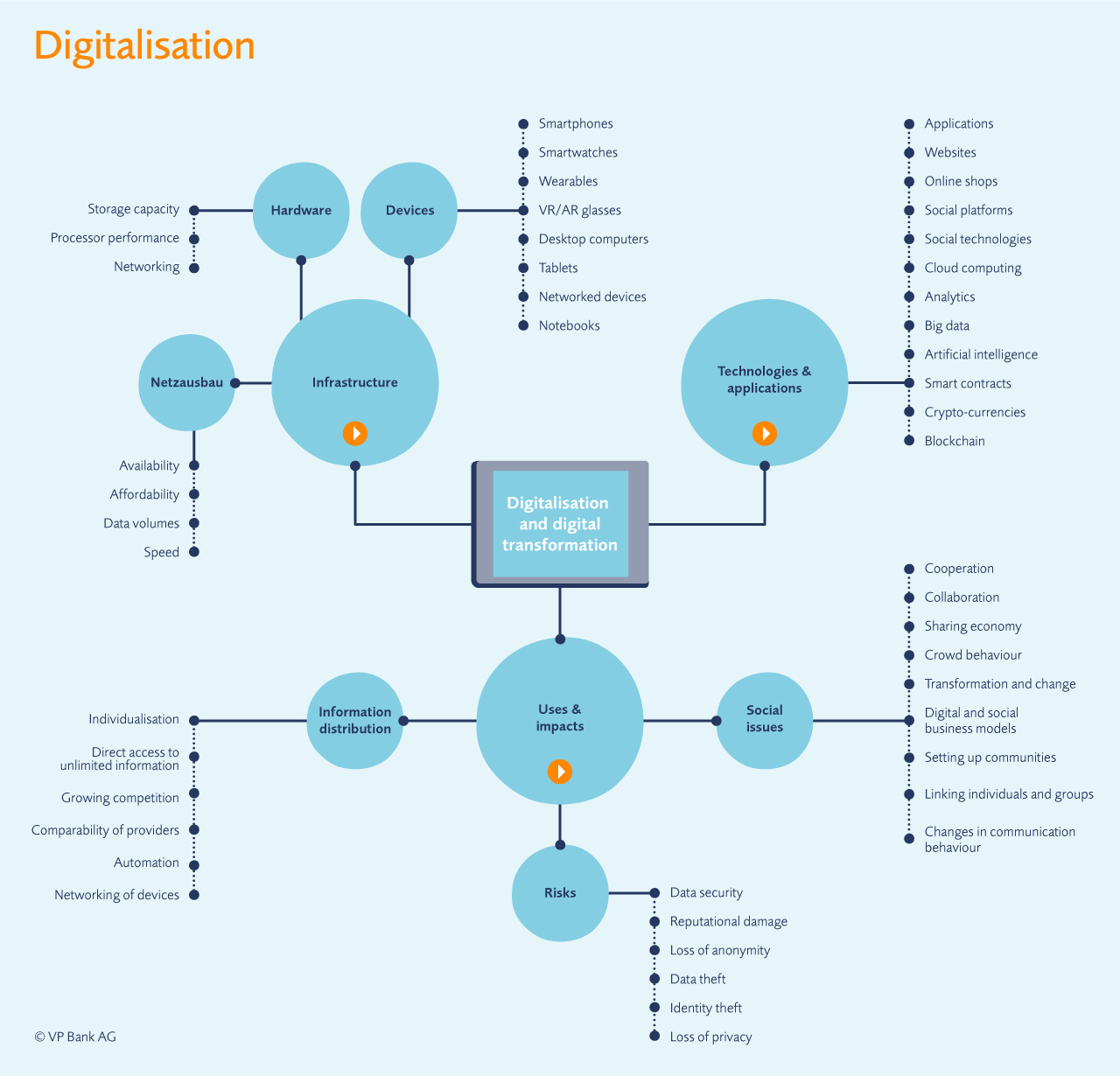
Prof. Jan vom Brocke
University of Liechtenstein Why digital is not good enough.
Much has already been spoken about digitalisation. The possibilities of shaping new forms of life and work are impressive. Too little, however, is done to address the question what we must do today in order to successfully enter the digital future. It goes without saying that expertise in working with digital technologies is crucial. To successfully enter the “man-machine society”, we must above all learn to offer added values which machines are incapable of achieving.
Where can such added values be found, which will turn us into the designers of a good digital world? In this article, I would like to argue precisely that we should not only run after the technologies but in a digital world it depends especially on us being aware of the “comparative competitive advantages” of us human beings and of letting them flow into the added value. I should also like to stimulate thought on the question whether we have laid down the right framework conditions for it in our organisations and in education.
What is digitalisation? Digitalisation, however diversely it is described nowadays, means “automation” in the final analysis. Other words are computerisation or even robotisation. Mobile apps, social networks and data analyses are only the beginning. They mark a path to increasing data processing by machines and – related to that – even to the substitution of work performed by humans. If industrialisation was the automation of production, then digitalisation is now the automation of administration and organisation.
Services provided by machines
Dreams of the future? Already in 2008, there were more machines than people in the internet and we use an increasing number of machines in our daily life. When we book a flight or a hotel, robots assume this task already now as it is machines, not humans which provide the service we request. In this respect, machines are vastly superior to humans for the former compare many hundreds of thousands of alternatives in a few minutes or seconds and this with high accuracy.
To offer added values, we should concentrate on those strengths of ours which still distinguish us from machines today. I should briefly describe a few:
- Emotionality: Humans, unlike machines still today, have feelings. What does this mean? We have gut feelings and can judge whether something “feels” good or bad or right or wrong against the background of a shared system of values. This is a great advantage as research has shown that emotion has a much stronger behaviour-influencing impact than cognition. Humans should be capable of experiencing their own feelings and those of others and taking them into consideration in their actions. Therefore, emotional competence is important. Emotionality must be given proper room over rationality: on the one hand, as this makes life worth living; on the other, however, because we will very quickly be outnumbered by machines in a purely rational world.
- Creativity: Humans, unlike machines still today, can develop new ideas. We can be creative and find alternative ways and new solutions whilst doing sport or on a beautiful hiking trip. In this manner, we are capable of questioning given structures, developing new approaches and shaping the world. Humans should be capable of exploiting their creativity to invent and design novel things in order to deliver an added value over machine-based activities. Therefore, innovatory competence isin demand. For this, we must allow divergent thinking and acting in order that a multitude of even unconventional ideas can be born. An important basis is the regard for innovation and at the same time, the appreciation of being different and the questioning of conventional approaches.
- Reflexivity: Humans, unlike machines still today, can grasp overall contexts and see more than the sum of their individual parts. We can judge whether developments, as a whole, proceed well or badly and in this context, are also capable of developing new goals and value systems – both for our society and for ourselves. People therefore should be capable of judging issues and at the same time, of seeing the overriding big picture. The capacity to observe not only single aspects but to understand situations holistically with their diverse consequences which are difficult to predict, can enable humans to play an important role in man-machine-societies.
- Activity: Humans, unlike machines still today, can move things ahead. They can shape matters including even complex issues. They can thus launch and steer change processes which are crucial for the continuous development of the economy and society, especially in cooperation with machines. Humans in the digital world should be able to implement things and contribute not only the necessary motivation and energy, but also specific skills and get the space they need made available. ”Actions speak louder than words” as Erich Kästner is often quoted. This is all the more true in the digital world in which humans will assert themselves, show initiative, commit themselves and stand up for a matter with conviction.
«Whoever behaves like a robot in a digital world has no future, as robots are superior to us in precision, speed and compliance.»
Whenever we would like to offer an added value over machines, then this can be achieved using our capacities of emotionality, creativity, reflexivity and activity. These are the skills we must particularly strengthen in a digital world in order to shape the added value in society and the economy (jointly with machines) for the good of all.
Do we do that? Are our employees strong in emotionality, creativity, reflexivity and activity? Is it that which we foster? For example, through organisational structures, management systems and corporate culture? What is our education system doing? Is it primarily emotionality, creativity, reflexivity and activity which is being taught? Whoever behaves like a robot in a digital world has no future, as robots are superior to us in precision, speed and compliance. For this reason, border officials are for instance already being replaced by machines in many airports. In the long term, humans will work only in places where values such as emotionality, creativity, reflexivity and activity are in demand. We should therefore urgently ensure that we, as humans, also contribute these capacities, strengthening and developing them. The job of the future is the job computers will not be able to do.
Digitalisation and transmission of knowledge
Please do not let us imitate robots but learn to make good use of them for our benefit. For instance, it is being discussed at universities whether digital forms of learning such as, for example, so-called massive open online courses (MOOCs) will one day render universities superfluous and the answer is naturally: no. Quite to the contrary, digitalisation will make universities become even more valuable places where the competence to act is taught and the development of personality can occur. So-called flipped lectures foresee, for example, that contents are taught using digital media prior to beginning a lecture, then initial exams take place in order to finally work with those who have passed the exams on exciting projects promoting, in the final analysis, values such as emotionality, creativity, reflexivity and activity. Digitalisation therefore fosters the non-digital area as those university teachers and universities which do not go beyond the pure teaching of knowledge will indeed cease to exist. It is obvious that this example can be easily transferred to all other areas of life and work, as well as to a bank.
«Each one of us can ask the question how much are we still rooted in our old ways of thinking and produce robots which are, however, far inferior to real robots.»
If we want to enter a good digital future, we must above all strengthen the emotionality, creativity, reflexivity and activity in ourselves and in our society. Each one of us can ask the question how much do we do that today or how much are we still rooted in our old ways of thinking and produce robots which are, however, far inferior to real robots. With that, I do not only mean education but also organisations and each one of us. I would like to appeal to all to discuss this topic on a wide front. Knowledge of current developments such as blockchain technology is a pre-requisite. These topics come and go and do so with increasing speed. What remains is our role as humans to learn how to use such technologies to the good of the economy and society. What this needs is a focus (or refocus) on human values such as emotionality, creativity, reflexivity and activity. Places and organisations which recognise and implement this will be the winners of digitalisation.



